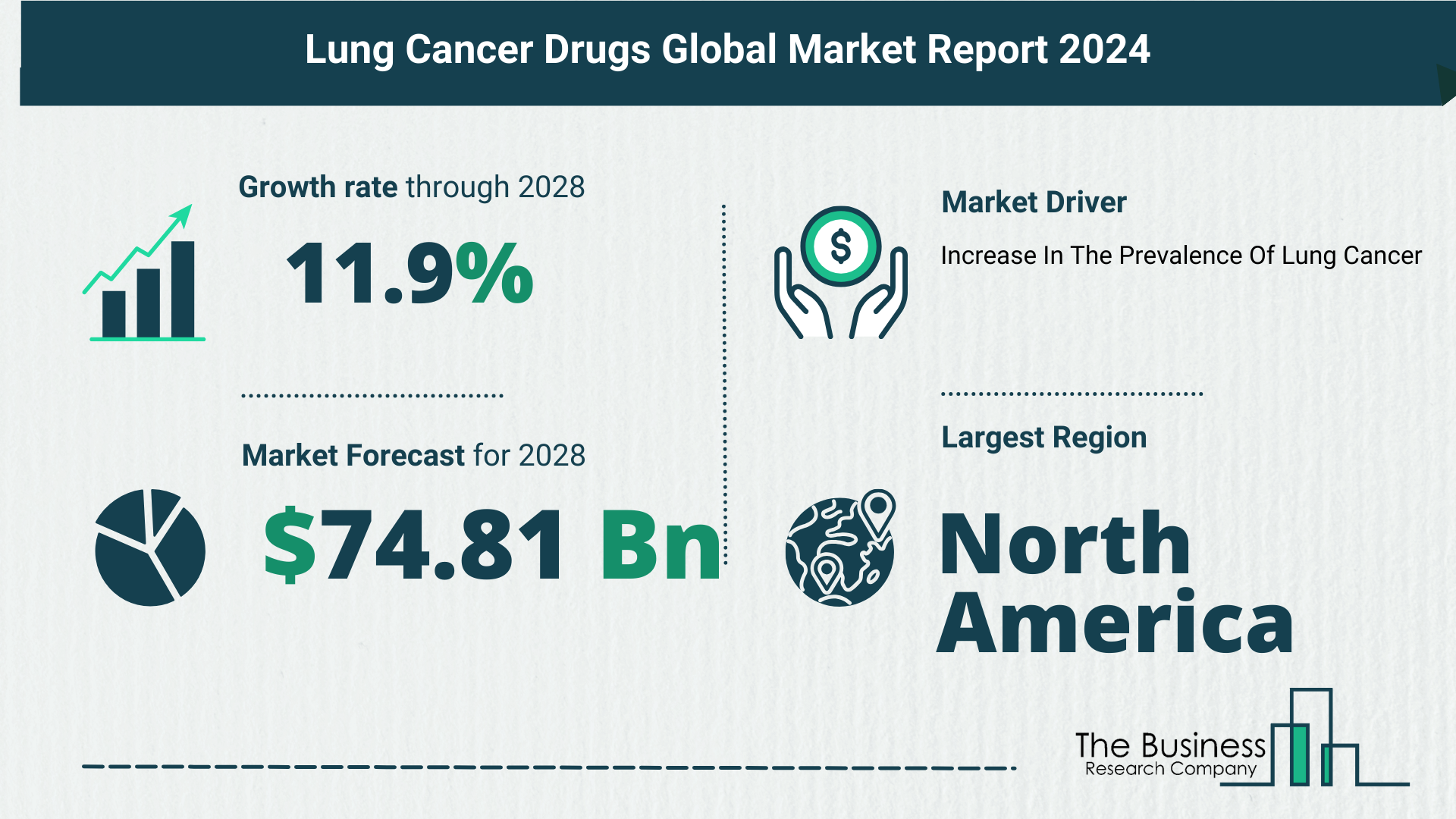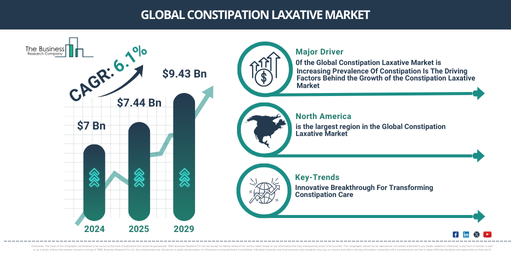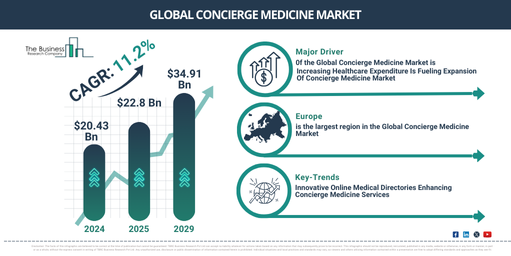What Is The Forecast Growth Rate For The Lung Cancer Drugs Market?
The Business Research Company’s market reports offer an in-depth analysis on the market’s growth potential, major drivers, key trends and more.
The lung cancer drugs market has experienced rapid growth, surging from $42.3 billion in 2023 to $47.72 billion in 2024, reflecting a compelling Compound Annual Growth Rate (CAGR) of 12.8%. This upward trajectory can be attributed to various factors, including epidemiology and demographics, regulatory approvals, the evolution of healthcare infrastructure, and increased patient awareness and education.
Future Projections: A Continuation of Growth
Anticipated future growth is substantial, with projections indicating an increase to $74.81 billion in 2028, driven by a CAGR of 11.9%. The forecasted surge is linked to health insurance and reimbursement policies, the ongoing development of healthcare infrastructure and access, and the burgeoning opportunities presented by emerging markets.
Catalyst for Growth: Smoking Prevalence
The prevalence of smoking is a significant driving force behind the escalating demand for lung cancer drugs. Smoking, a leading cause of lung cancer, is responsible for approximately 90% of the risk in men and 70 to 80% in women. Notably, statistics from the Centers for Disease Control and Prevention highlight the persistent challenge, with 11.5% of American adults being current smokers in 2021, translating to an estimated 28.3 million adult smokers in the USA. This alarming prevalence fuels the growth of the lung cancer drugs market.
- Smoking Impact: Smoking is the primary cause of lung cancer, explaining a substantial percentage of cases.
- Epidemiological Snapshot: CDC data provides insights into the prevalence of smoking in the USA.
Market Leaders: Key Companies
Prominent players in the lung cancer drugs market include Bristol-Myers Squibb, Merck & Co., F. Hoffmann-La Roche, Novartis, and Pfizer, among others. These industry giants play a pivotal role in driving innovation and addressing the evolving needs of patients.
- Industry Pioneers: Bristol-Myers Squibb, Merck & Co., and F. Hoffmann-La Roche lead the market.
- Global Presence: Companies like Novartis and Pfizer contribute to the market’s global dynamics.
Read More On The Lung Cancer Drugs Market Report 2024 – https://www.thebusinessresearchcompany.com/report/lung-cancer-drugs-global-market-report
Emerging Trend: Targeted Drug Therapy
A noteworthy trend in the lung cancer drugs market is the introduction of targeted drug therapy in combination with other treatment modalities. This approach involves leveraging immunotherapy drugs alongside interventions such as chemotherapy for enhanced diagnosis, prevention, and treatment. Merck & Co.’s pembrolizumab, branded as Keytruda, exemplifies this trend, showcasing improved lung cancer outcomes when combined with chemotherapy.
- Combination Therapy: Targeted drug therapy combined with other modalities for comprehensive lung cancer treatment.
- Immunotherapy Advancements: Drugs like pembrolizumab enhance the immune system’s ability to combat cancer cells.
Market Segmentation: Insightful Perspectives
Understanding the lung cancer drugs market requires a segmented view, considering drugs, disease types, and end-users.
- Drug Segmentation: Gemzar, Paraplatin, Taxotere, Navelbine, Avastin, Tarceva, Iressa, Other Drugs.
- Disease Type Segmentation: Small cell lung cancer (SCLC), Non-small cell lung cancer (NSCLC).
- End-User Segmentation: Hospitals, Clinics, Other End-Users.
Regional Dynamics: North America Leads
In 2023, North America emerged as the largest region in the lung cancer drugs market, signifying its substantial influence. Looking forward, the Middle East is poised to be the fastest-growing region during the forecast period.
- North America’s Dominance: The region’s leadership highlights its role in shaping market dynamics.
- Middle East Potential: The region is expected to witness rapid growth, presenting opportunities in the lung cancer drugs market.
Future Trends: Charting Innovation
Anticipated trends in the upcoming years include advancements in targeted therapies, immunotherapy, genomic profiling, and a heightened focus on clinical trials and research.
- Targeted Therapies: Precision-focused therapies for enhanced efficacy.
- Immunotherapy Evolution: Advancements in leveraging the immune system for targeted cancer treatment.
- Genomic Profiling: Tailoring treatment based on individual genetic profiles.
- Clinical Trials and Research: A growing emphasis on research to drive innovation in lung cancer treatment.
Conclusion: A Landscape of Progress
As the lung cancer drugs market continues its trajectory of growth, fueled by factors like smoking prevalence, targeted therapies, and evolving treatment modalities, the landscape promises innovation and advancements. Addressing the increasing burden of lung cancer requires a multifaceted approach, and the market’s evolution reflects the collective efforts of stakeholders in reshaping the future of lung cancer treatment.
Request for A Sample Of The Global Lung Cancer Drugs Market Report:
https://www.thebusinessresearchcompany.com/sample_request?id=2567&type=smp



